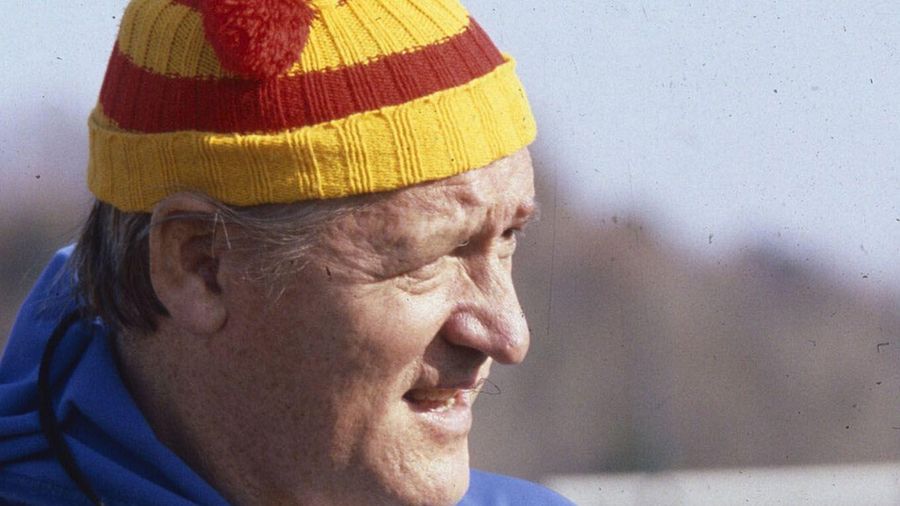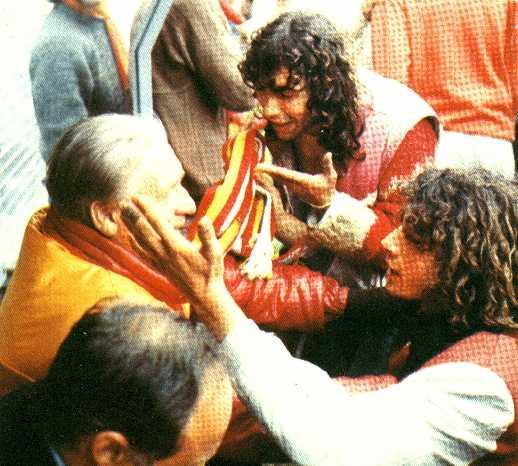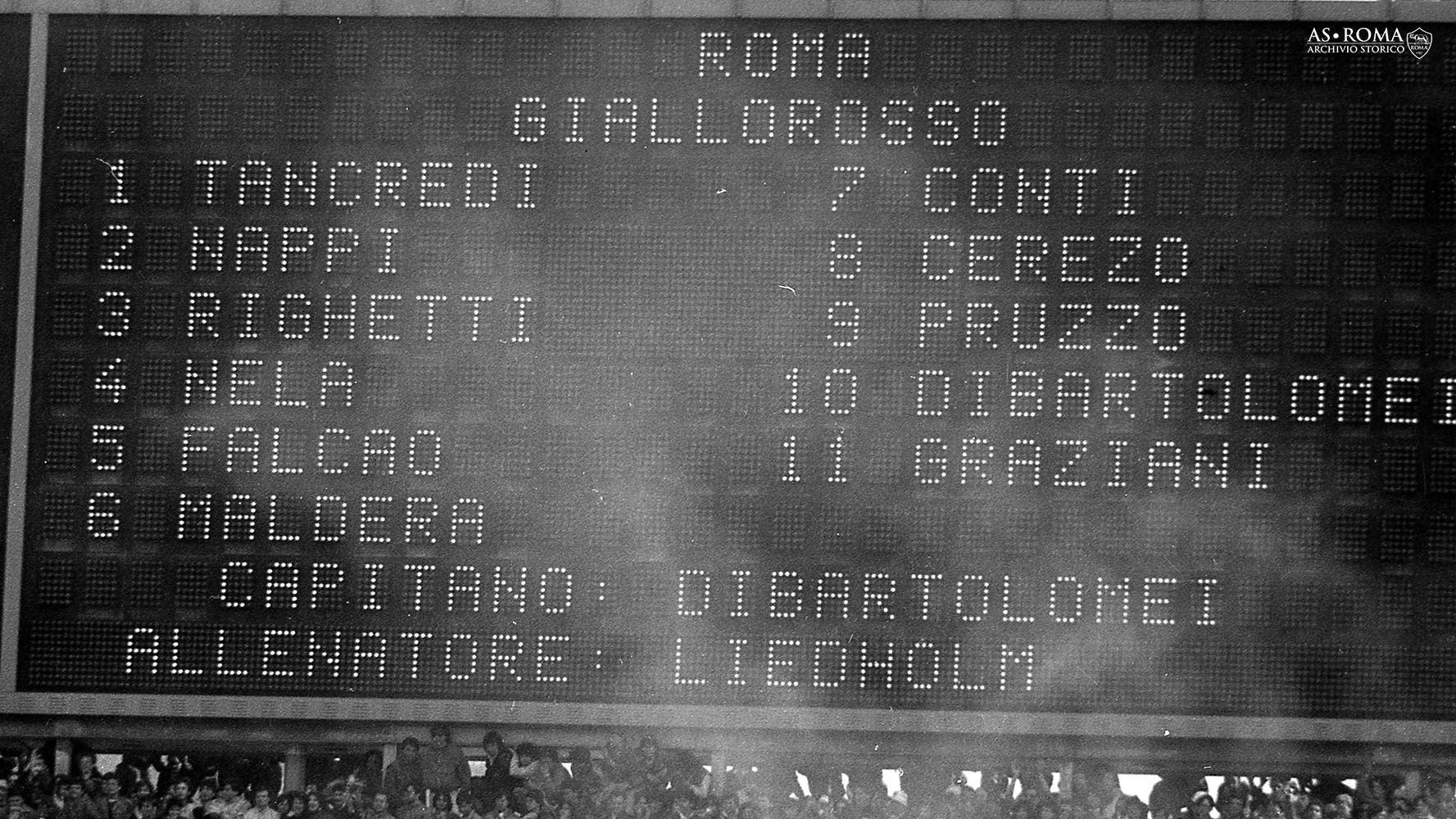










If a child asks you about Nils Liedholm, you can quote what Jose Mourinho said on the day of his unveiling as Roma coach: "Here no one can be compared to Nils Liedholm."
Nils Liedholm was the greatest coach in our history. It’s that simple.
He guided Roma to our first Scudetto triumph in 41 years, overcoming a Juventus side boasting seven world champions plus Michel Platini and Zbigniew Boniek, and might have taken Roma to Serie A glory two seasons earlier had it not been for the infamous incident in which Maurizio Turone’s potential title-winning goal was ruled out in Turin. He won four trophies, more than any other Giallorossi coach: the aforementioned Scudetto as well as three Coppa Italias (much harder to win back in the day), pushing the club to new heights, to places beyond Roma fans’ wildest dreams, such as the 1984 European Cup final, which ended with an agonising penalty shootout defeat.
However, aside from all the trophy glory, Nils Liedholm’s Roma encapsulated a certain style, a way of life, a form of expression. He defined an era. Our golden era.
The way he presented himself on the sidelines was special in itself, exuding stolidness, grace and serenity. It was his own unique style. He would elegantly stroll towards the Sud before breaking into a sprint and celebrating with abandon in front of the Giallarossi faithful.
His Roma side left fans both overjoyed and scratching their heads in amazement with their brand of football. They could hit hard, play it simple or move the ball around tiki-taka style, decades before the term became popularised. A team of real winners which would leave the opposition spellbound.

Watching Liedholm's Roma, the Roma to end all Romas, felt like enjoying a glorious sunny day. One that never ended. I know that if the lucky ones who experienced those glory years close their eyes and think of that Roma, they picture a sun-kissed day at the Olimpico, the rays shining down on the Curva Sud, or the majesty of Falcao on the pitch.
Liedholm built his team around five pivotal players: Bruno Conti, Carlo Ancelotti, Toninho Cerezo, Agostino Di Bartolomei, Roberto Pruzzo. The midfield was what made Roma tick, the beating heart of not just a football team but of a city desperate to end a 41-year title drought. How many people had come and gone during that time? How many prayers unanswered? How many matches played?
Yet the moment would arrive. It was 8 May 1983 – 5:45 in the afternoon to be precise – and the city of Genoa would witness Roma becoming champions of Italy once more. Despite efforts to the contrary, a full-scale pitch invasion would take place with Geppo racing over to embrace Liedholm, who was then hoisted into the air by the ultras.

There’s a photo in which you can see Geppo’s amazement and joy as he is about to embrace the coach who brought him so much happiness. This is the first image which comes to mind when the Giallorossi think about the end of those 41 barren years. It's just wonderful.
Geppo was a poet, a lad from the Curva Sud who came up with the words and music which was belted out – and is still today – by the Roma faithful. While Geppo was the people, Liedholm was Il Barone. The Baron. If you think about it, this is Roma in a nutshell: blood and gold, the common man and the aristocracy. It’s the bedrock of what we are: our DNA, our history.
Nils himself was famous for his memorable oxymoronic quips, such as, “It’s easier to play with ten men.” He spoke a language all of his own, turning Roma into a code, a belonging, something categorically ‘ours’. That was Nils Liedholm’s Roma.

When Liedholm passed away, Falcao commented: "People like him should never disappear." However, besides the memories he left us, the beauty he showed us which remains to this day – and those who were there can close their eyes and picture that beautiful day – I think Nils Liedholm was and will forever remain the coach of Roma for one thing above all: he chose Agostino Di Bartolomei as captain.
It was a decision taken when Ago was 18 years old, in the mid-70s, shortly after Il Barone had joined Roma. Liedholm saw him make a speech after lunch to the team that had just become Italian Primavera champions. There Liedholm – he later recounted – understood that this young footballer so well prepared, serious and attentive named Agostino would become Captain Di Bartolomei.
A coach chooses players, trains them, manages them, spurs them on, criticises them, loves them, tells them off or simply says nothing at all. A great coach does not abandon their players – and Liedholm showed faith in Ago even when the club did not. Ask Agostino’s nearest and dearest what Liedholm meant to him and that will tell you all you need to know.
Teams and clubs are the products of those who represent them and that Roma side was made up of great men who were tasked with pulling off one feat in particular: keeping alive the Giallorossi’s dream of winning Serie A and then actually bringing the trophy home.
Had another player been tasked with captaining Roma then history would have taken a different course.
For several years, everything was perfect. Because the team that was supposed to take us to previously unscaled heights was in the hands of the right man, who made the right choices. And he left us with a line we will never forget, not on his 100th birthday, nor for 100 more years:
Tancredi-Nela-Vierchowod-Ancelotti-Falcao-Maldera-Conti-Prohaska-Pruzzo-Di Bartolomei-Iorio.
Thank you, Nils Liedholm.
Watching Liedholm's Roma, the Roma to end all Romas, felt like enjoying a glorious sunny day. One that never ended.
- Tonino Cagnucci
I confirm that I have read the privacy policy.
© 2018-2025 Soccer S.r.l. – EU VAT IT09305501000 - all rights reserved. The AS Roma names, logos and artwork are registered or unregistered trademarks of Soccer S.r.l. All other trademarks may be the property of their respective holders.




 Shop
Shop







































